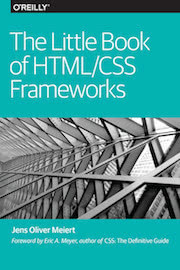Frameworks
Testing 10 JavaScript Frameworks on Their HTML Defaults
When you validate the demo and starter projects of popular frameworks like React, Vue, Angular, Svelte, Astro, &c., what do you find? On challenging the idea that JavaScript frameworks could fuel the HTML crisis.
#16 · · development, javascript, html, conformance
HTML/CSS Frameworks, in Their Own Words (by Word Cloud)
Checking in on Bootstrap, Tailwind, Foundation, Bulma, Milligram, Pure, and UIkit.
#15 · · development, html, css
JS Frameworks, in Their Own Words (by Word Cloud)
Handing the microphone to React, Vue.js, Angular, Svelte, Express, Meteor, and Next.js.
#14 · · development, javascript
Web Frameworks, Coding Guidelines, Quality Control, and the Craft of Web Development
“Good frameworks aim to be tailored, usable, and extensible”? “Coding guidelines must be communicated, enforced, and reviewed”? “No website should go without a plan for quality control”?
#13 · · development, quality

The Little Book of Little Books
The consolidated and updated version of The Little Book of HTML/CSS Frameworks, The Little Book of HTML/CSS Coding Guidelines, and The Little Book of Website Quality Control!
#12 · · books, development, html, css, quality
The Frameworks Paradox
The more complex a website, the bigger the need for a framework, the less effective an external framework. This is not new, and not even a paradox because an internal—homemade—HTML/CSS framework is always an option. However—
#11 · · development
The Cost of Frameworks, Illustrated
A visual attempt to show how for everything built for the long run, external frameworks are a pricey crutch that has to be avoided or be thrown away at the earliest time. The reasons: quality—and cost.
#10 · · development, quality
Frameworks, Libraries, and the Modern Web Developer: Web Development, Overdone
We are raising tool-dependent rather than self-reliant developers. Aren’t we.
#9 · · development
What I Learned Building Google’s Web Frameworks
On building Google’s Go and Maia HTML/CSS frameworks, and succeeding and failing as a tech lead.
#8 · · development, html, css
On Tailoring and Web Frameworks
After building early frameworks for GMX and Google I had rushed to squeeze my experience into a (literally) little book. In it there’s emphasis on a priority I’ve always deemed critical for us developers: the idea of tailoring…
#7 · · development
The Two Ground Rules for Using a Framework
Follow the documentation, don’t overwrite framework code. These two rules are golden.
#6 · · development

The Little Book of HTML/CSS Frameworks
It’s out! My new book, The Little Book of HTML/CSS Frameworks, is now available. I myself have been surprised by the sudden release, and while I’m still unsure about how print copies can be obtained, the book can now be downloaded for free at O’Reilly.
#5 · · books, development, html, css
Web Frameworks in a Nutshell
My next book is coming! “The Little Book of HTML/CSS Frameworks.” I’m wrapping it up with the team of O’Reilly as we speak. In the book, I share much of my experience architecting, developing, and maintaining web frameworks, as I’ve done for Google, Aperto, and GMX…
#4 · · development, quality
HTML/CSS Frameworks: Useful, Universal, Usable, Unobtrusive
A high quality HTML/CSS framework needs to have four attributes: useful, universal, usable, and unobtrusive. The four U’s.
#3 · · development, html, css, quality
A Few Words on HTML/CSS Frameworks
Public, or open, or external, HTML/CSS frameworks are rarely a good idea. Why? Because framework developers are outside of your organization and cannot know your needs. This simple fact, the inevitable ignorance of a third party, means that—
#2 · · development, html, css, minimalism
Choke Web Development Framework 1.0
After years of thorough research I may finally present the Choke Web Development Framework 1.0, “Choke” or “CWDF” in short. Choke is an easy-to-use, easy-to-maintain, and future-proof platform for web design and development…
#1 · · development, css
